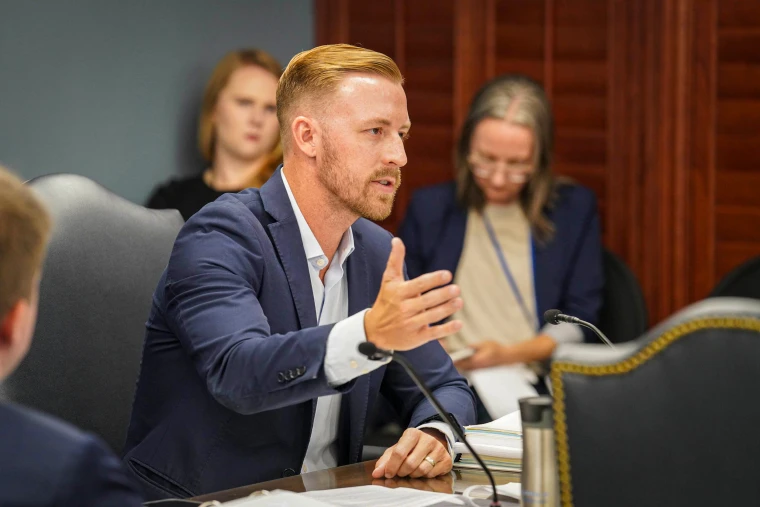Oklahoma’s Superintendent Ryan Walters Sparks a Holy War in Classrooms

Introduction to the Conflict in Oklahoma Education
The state of Oklahoma is presently enmeshed in a multifaceted controversy characterized by the actions and policies implemented by Superintendent Ryan Walters. As an individual at the helm of Oklahoma’s educational landscape, Walters has cultivated significant discourse surrounding a variety of educational issues. The growing tensions suggest that the state is experiencing nothing short of a “holy war” within its classrooms, a term that describes the fierce debates over educational content and pedagogical approaches that have emerged in response to his initiatives.
Walters has positioned himself as a proponent of educational reform, advocating for particular ideologies that, in his view, are designed to enhance the moral and academic standing of the state’s public school system. However, these measures have often met with passionate resistance from educators, parents, and community members. Critics argue that his policies threaten to undermine the core principles of academic freedom and inclusivity, raising alarms about their broader implications for both teachers and students in Oklahoma’s educational framework.
In tackling issues such as curriculum design, teaching methodologies, and the incorporation of various cultural perspectives in the classroom, Walters has ignited a vigorous debate. This dispute is reflective of a larger national dialogue on educational practices, whereby educators find themselves navigating the complexities of teaching in an increasingly polarized environment. The tension has prompted significant backlash, with many stakeholders expressing concerns that the proposed reforms may inadvertently marginalize certain voices and perspectives within the student body.
As the situation continues to unfold, it is essential to comprehend the various dimensions of this educational conflict. Understanding the motivations behind Walters’ policies, as well as the reactions from impacted parties, is vital for discerning the landscape of education in Oklahoma and the potential ramifications these decisions may have on the state’s future generation.
Background of Ryan Walters and His Educational Philosophy
Ryan Walters, the current Superintendent of Oklahoma’s public education system, has had a diverse career within the realm of education. Prior to assuming this pivotal role, he served in various capacities, including as a teacher and an administrator. His experiences in the classroom and administrative offices have significantly shaped his understanding of the educational landscape, allowing him to identify the challenges that schools face. Walters’ tenure in education has been characterized by a commitment to academic excellence and a dedication to fostering an environment conducive to learning.
Walters identifies himself with a conservative educational philosophy, which prioritizes parental involvement, rigorous academic standards, and a strong emphasis on traditional values. His approach often reflects concerns over curriculum content, particularly regarding issues of social justice and critical race theory. This perspective influences his educational policies and the initiatives he endorses. Under Walters’ leadership, there is a noticeable focus on promoting a curriculum aimed at reinforcing patriotism and national pride among students, which he views as essential for fostering a united community.
The educational priorities articulated by Ryan Walters highlight a shift towards conservative ideologies that resonate with a significant segment of Oklahoma’s population. His advocacy for parental rights in school governance and accountability measures for educators underscores his commitment to transparency and community involvement. However, these ideals have also attracted criticism and sparked debates among educators and policymakers who advocate for inclusive and progressive educational practices. Understanding Walters’ background and educational philosophy is crucial for grasping the complexities of his administration and the opposition he encounters in enacting his vision for Oklahoma’s schools.
Key Policies Introduced by Ryan Walters
Since taking office, Oklahoma Superintendent Ryan Walters has articulated and enacted a series of educational policies that reflect his vision for the state’s school system. One of the most significant changes has been his approach to curriculum development. Walters has advocated for the implementation of a more traditional curriculum, emphasizing foundational skills and core subjects, which he believes will better prepare students for future success. This initiative has stirred debate among educators who argue that a well-rounded education should also encompass critical thinking, arts, and social studies.
In addition to curriculum adjustments, Walters has proposed modifications in educational funding allocations. His administration has sought to direct more resources towards charter schools and school choice initiatives, aiming to enhance competition within the educational system. Critics argue that this shift undermines public schools by diverting funds away from them, potentially impacting overall educational quality and the resources available to students in traditional public school settings.
Furthermore, Walters has also introduced new teacher evaluation systems, which prioritize measurable student outcomes. Supporters of this policy claim it encourages accountability among educators, ensuring that they deliver effective instruction. However, opponents believe that rigid evaluation metrics can lead to undue stress on teachers and may not accurately reflect their individual contributions to student learning.
Controversially, some of Walters’ policies have faced significant backlash from various stakeholders, including educators and parents. Measures addressing themes such as gender identity and race in the classroom have been particularly contentious, raising concerns about academic freedom and inclusivity in educational settings. As these policies unfold, they continue to shape the ongoing discourse surrounding education in Oklahoma, highlighting the polarized views on the direction of the state’s schools.
Reactions from Educators and the Community
The announcement of Superintendent Ryan Walters’ policies has ignited a variety of reactions from educators, parents, and community leaders across Oklahoma. The educational landscape has grown increasingly polarized, with many voices raising concerns over the potential implications of these new guidelines. Educators, in particular, have expressed feelings of unease regarding job security. Many fear that shifts in curricular focus and instructional standards could render their positions vulnerable, fostering an environment of apprehension among teachers who strive to provide quality education amid uncertainty.
In addition to concerns about job security, educators have articulated worries about the potential erosion of educational standards. With an emphasis on specific ideologies and the removal of certain content from curricula, teachers feel that the ability to teach comprehensively and without constraint may be compromised. This concern resonates not only with educators but also with parents who wish for their children to receive a well-rounded education that encourages critical thinking. Many parents have voiced their discontent, arguing that the new policies could lead to a narrowed learning experience for their children, potentially hindering their academic and social development.
Community leaders are also weighing in, with some expressing support for Walters’ initiative as a necessary step towards creating a more traditional education structure. However, this support contrasts starkly with the apprehension exhibited by others in the community who view the changes as detrimental to the progressive strides made in recent years toward inclusivity in education. Ultimately, the varied perspectives on Walters’ policies underscore the complexities of educational reform in Oklahoma, reflecting a community grappling with the balance between tradition and progressive educational ideals while deeply concerned about the impact on student learning experiences.
The Role of Political and Ideological Divisions
Political and ideological divisions significantly impact the debate surrounding the leadership of Oklahoma Superintendent Ryan Walters. These divisions manifest in various forms and are often rooted in broader national trends, reflecting a polarized political landscape where education policy becomes entwined with party ideology. Walters’ tenure has become a focal point for ongoing struggles between conservative and liberal factions within the state, particularly concerning educational content and administrative decisions.
A prominent aspect of this landscape is the alignment of various groups based on ideological beliefs. Conservative factions tend to support Walters’ initiatives, perceiving his approaches as aligned with their values that prioritize parental rights and local control over education. They argue that his policies represent a return to foundational educational principles. Conversely, progressive groups often express deep opposition, viewing his measures as detrimental to inclusivity and the diverse needs of Oklahoma’s student population. This ideological opposition fuels public debates and rallies, showcasing the tensions that arise within communities as they respond to Walters’s actions.
Moreover, partisanship influences public opinion significantly. Polls indicate that attitudes toward Walters’ leadership vary sharply along partisan lines; Republicans often support his measures while Democrats routinely challenge them. This polarization extends to various stakeholders, including teachers’ unions, parents, and educational organizations, which have become battlegrounds for ideological conflicts. As educators and administrators navigate these divisions, they often find themselves caught between their professional responsibilities and the pressures of a politically charged atmosphere.
In summary, the political and ideological divisions in Oklahoma are pivotal in shaping the discourse surrounding Ryan Walters’ leadership. These divisions not only define public opinion but also influence how policy changes are perceived and implemented in the educational landscape of the state.
Media Coverage and Public Discourse
The ongoing conflict in Oklahoma schools, epitomized by Superintendent Ryan Walters’ controversial decisions, has garnered significant attention from various media outlets. This coverage has played a pivotal role in shaping public discourse around education in the state. News organizations have adopted diverse framing techniques, which considerably influence how the public perceives the actions of school officials and the broader educational landscape.
Many media outlets have portrayed Walters’ actions within the context of a larger cultural struggle, often referred to as a “holy war” in education. This narrative positioning suggests that his initiatives are not merely administrative but are deeply tied to ideological battles over what should be taught in schools. Such characterizations evoke strong emotional responses from both supporters and critics, thus polarizing public opinion. Some outlets emphasize the intent behind Walters’ policies, arguing that he aims to enhance educational standards, while others highlight the risks of overreach and the potential undermining of inclusive educational practices.
The implications of this media framing extend beyond mere public opinion; they also affect policymaking and community engagement in Oklahoma. When stories focus on extreme viewpoints, they can stifle nuanced discussions that explore the complexities of educational reform. Furthermore, sensationalized narratives may lead to increased anxiety among parents and educators regarding the state of education, fostering a climate of fear rather than constructive dialogue.
In addition, the role of social media cannot be underestimated in this discourse. Platforms like Twitter and Facebook have amplified voices on both sides of the debate, often leading to an echo chamber effect that can entrench existing beliefs. As the coverage continues to evolve, the public’s understanding of education in Oklahoma will likely be shaped by these ongoing narratives, making it essential to remain vigilant in promoting balanced and informed discussions.
Impact on Students and Educational Outcomes
The educational directives initiated by Superintendent Ryan Walters have ignited considerable debate regarding their potential influence on student learning and the overall educational environment in Oklahoma. With a focus on a specific curriculum structure and teaching philosophy, these changes may have far-reaching implications on students’ academic performance.
One of the primary concerns surrounding Walters’ policies is the effect on curriculum content. By emphasizing certain ideological perspectives over others, educators may face constraints on providing a balanced educational experience. This could limit students’ exposure to diverse viewpoints and critical thinking opportunities, which are pivotal for comprehensive learning. A well-rounded education is critical to fostering skills that students will need in a diverse and interconnected world. Should the curriculum become overly prescriptive, it might stifle creativity and hinder the development of analytical skills that students require for future academic and career success.
Moreover, the impact on students’ emotional well-being cannot be understated. A curriculum that lacks inclusiveness or disregards students’ individual backgrounds can lead to feelings of alienation or disenfranchisement among learners. The psychological implications of such educational environments may affect students’ confidence, engagement, and ultimately their overall academic performance. When students feel disconnected from their learning material, there is a risk of diminished motivation and an increase in dropout rates.
In the context of educational outcomes, it is crucial to monitor the longitudinal effects these policies may have on student achievement metrics. Metrics such as standardized test scores, graduation rates, and college readiness indicators will serve as essential barometers of success or challenges arising from the newly implemented educational strategies. Binding these elements together, the relationship between policy changes and student outcomes will merit close observation as Oklahoma navigates this transformative period in its educational landscape.
Comparative Analysis of Education Policy Conflicts Across the United States
The situation unfolding in Oklahoma under Superintendent Ryan Walters is emblematic of a larger trend observed across various states in the United States. Conflicts related to education policies often arise when state leadership enacts reforms that directly impact how curricula are structured, especially concerning sensitive topics such as race, gender, and sexual orientation. This section aims to provide a comparative analysis of Oklahoma’s scenario in contrast with similar educational disputes in other states.
For instance, in states like Florida and Texas, the introduction of legislation that restricts discussions on critical race theory and limits the teaching of LGBTQ+ issues has ignited vigorous opposition from grassroots organizations, educators, and parents alike. The response seen in these states mirrors Oklahoma’s challenges, as community members voice their concerns over potential infringements on educational freedom and the perceived imposition of ideological agendas in classrooms. These protests often lead to significant public discourse, reflecting a shared anxiety regarding educational content that influences the upbringing and worldview of students.
Moreover, in states such as California, conflicting educational policies have emerged, particularly in urban areas where the population is more diverse. Here, the push for a more inclusive curriculum often encounters resistance from conservative factions who advocate for traditional educational approaches. This highlights the unique challenges that arise not only from differing political landscapes but also from demographic variances across states. While Oklahoma grapples with its own contentious policies, the broader narrative of educational leadership versus grassroots opposition plays out in multiple forms nationwide.
This comparative analysis underscores that while the specific issues may vary, the underlying themes of ideological conflict and community resistance to educational reforms resonate across state borders, indicating a national trend in educational policy debates.
Looking Forward: Possible Resolutions and Next Steps
The recent conflict in Oklahoma classrooms, greatly influenced by Superintendent Ryan Walters’ policies, suggests that a multifaceted approach is essential for effective resolution. One significant area of focus is the upcoming elections, which could play a crucial role in shaping educational policies. As the electoral landscape evolves, candidates who prioritize balanced and inclusive educational frameworks may emerge, potentially offering alternatives to the current policies that have sparked substantial controversy.
Furthermore, advocacy groups are likely to become increasingly vital in this discourse. These organizations can mobilize educators, parents, and community members to advocate for teaching practices that respect diverse viewpoints and foster a constructive learning atmosphere. By aligning their objectives with the needs of local constituents, advocacy groups can exert pressure on policymakers to reconsider initiatives that might exacerbate classroom tensions.
Public engagement initiatives could also serve as a path toward resolution. Town hall meetings and forums provide platforms for stakeholders to share their concerns regarding educational practices and policies. Such dialogue fosters understanding and can bridge the divide between differing perspectives on educational content and approaches. This could promote constructive conversations about inclusion, respect for cultural diversity, and the importance of critical thinking in educational environments.
Additionally, heightened training and professional development for educators may mitigate some challenges stemming from the current policies. Equipping teachers with strategies to effectively address controversial topics and implement inclusive curricula could enhance classroom dynamics, allowing for a more welcoming environment for all students.
In summary, navigating the ongoing conflict in Oklahoma classrooms necessitates a careful blend of political action, community engagement, and professional development. By considering these avenues, it is possible to chart a course towards a more stable and supportive educational landscape that benefits students across the state.











Leave a Reply
You must be logged in to post a comment.